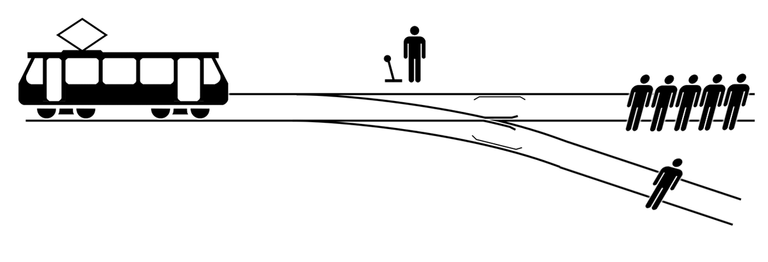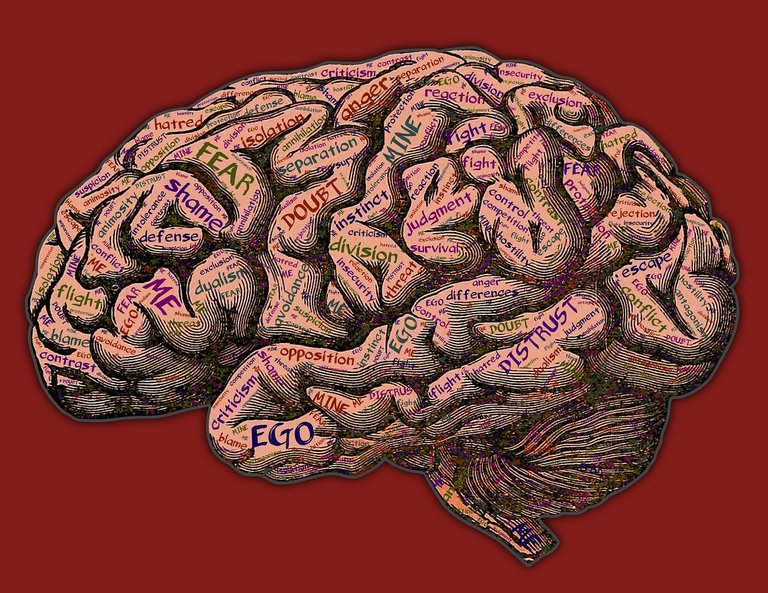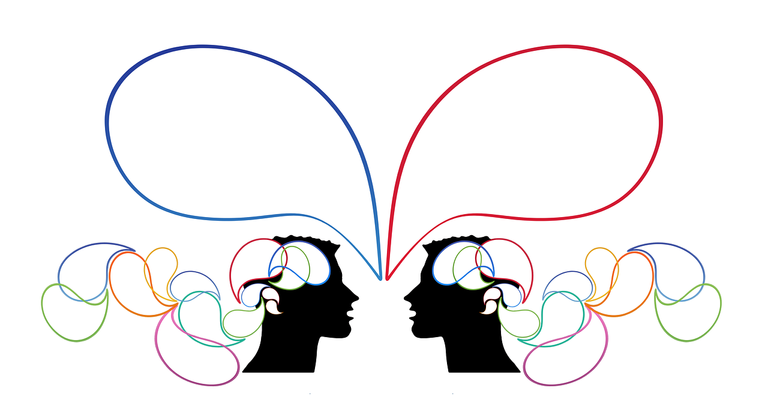The trolley problem and its use in ethics and morality

The trolley problem is a famous thought experiment in human ethics that has gained fame in the scientific community as well as embedding itself into the heart of internet culture. Though it frequently pops up in lectures and Facebook timelines, many people are still confused about what it is and what it means. Here I will explain what it is and why it has created as much controversy as it has
The problem
The trolley problem starts with you standing in a train yard at the fork of the tracks by the lever to switch the rail it will go down. A train is barreling down the tracks towards the split where five people are tied to one side of the tracks and one person on the other side and it will hit the five people if you do not pull the lever. There are two things you can do.
You can do nothing and let the trolley kill the five people or you can pull the lever to change the direction of the train and in doing so you will only kill one person.
Which is the most ethical decision to make?

Ethics
This problem is thought provoking in many ways and has been the catalyst for many books, controversies, and has spawned many alterations. The main issue this experiment questions is with whether pulling the lever or not makes you a killer. In the scenario where you pull the lever you are faced with a big moral dilemma, by pulling the lever you will have caused the death of somebody intentionally to save the lives of the others. Would this make you a killer or a lifesaver?
The alternate option is that you could not pull the lever. This brings up its own questions, on one hand you will save a person's life, on the other hand five people will die. The idea of this is that when you don't take part in the scenario the result is not of your doing, the whole point is that it is in your control, not of your doing, the whole point is that it is in your control. In not doing anything and not taking action to save the life of anybody does this make you at fault for the deaths that follow?

Statistics show that about 90% of people said that they would pull the lever. This seems like the logical answer but consider this: the five people are random but the one person is a loved one. Would you still pull the lever? Is the life of your loved one worth five lives of people you don't know, all of whom that may have lives just as full and meaningful as your loved one? What is the most ethical decision here? This is the question people have been debating since 1968 and has been a key subject in programming of self driving cars and other potentially deadly uses of artificial intelligence.
Debate history
The trolley problem was first conceived by Philippa Foot back in 1967 [1]. Often used as a moral philosophy question used in colleges around the world. There are only two groups for this problem, those who pull the lever, and those that don't. The choice seems obvious... pull the lever, but why? Why do we immediately assume one life is worth less than five lives? Is it a sense of altruism or even on the extreme side of the spectrum, selfishness?
In one survey people were given 3 scenarios. The conventional trolley problem as discussed here with slight alterations. One problem with four people on one side and two on the other. The other with five people on one side and four on the other. The third and most different one is where five people are on the tracks and you are on top of a bridge over the tracks with a large man. You can push the man off the bridge to stop the train and stave the five or you can not do that and all five will die but the large man will live.

The findings of this study show that for the bridge problem only 26% of people would push the man. For the two to five person lever problem 79% of people chose to pull the lever. For the four to five person problem 68% said they would pull the lever. Why would this be?
The data gathered from the experiments is interesting because it seems to contradict the main arguments that in killing one person instead of five you are being more ethical.
In the 2:5 person scenario it apparently is easier for people to decide the pull the lever and kill two people opposed to the 4:5 person scenario. Despite there being less of a difference of people in the 4:5 person scenario, less people decided to pull the lever. One explanation to this is that people think deeper into the lives of each person when the difference is less because the negative effects of making the "wrong" choice could be greater. This I believe is supported by the bridge problem. When confronted with a similar choice only 26% of people decided to push the man off the bridge to save the five other people. Is this because if they kill the man to save the lives of the five that they will think they are more directly responsible for the murder? If this is the case then somebody's decision may be grounded more in selfishness than previously thought. [2]

There has been extensive research done into isolating the factors of deciding what is right or wrong, how left/right brain decisions are made and significant progress has been made on these fronts too. However, when trying to do the same thing in more complex situations such as the trolley problem and other thought problems we find that it is more difficult. This is because thought problems are designed to not have a clear answer, but to instead be thought provoking and conceptual than conducting experiments. This is why the realm of philosophy was as present as it was in ancient times. [3] [4]
Some examples of famous thought experiments include Zeon’s Paradox of Achilles and the Tortoise where a tortoise challenges the mighty Achilles in a race but with a small head start. And with that small distance advantage Achilles is caught approaching indefinitely but never passing the tortoise. Here is a link to a post I made on the topic, Achilles and the Tortoise. Another famous one but more recent is the Schrödinger's cat experiment where a cat is put in a box and through a series of steps you are told to determine if the cat is alive or dead without opening the box.
The idea is that the cat is in a superposition of being both alive and dead simultaneously. The purpose of these thought experiments is to substitute mathematical proof and experimentation with more conceptual reasoning to explore a topic and come to an end result. These were especially useful in ancient times when scientific research was in its infancy compared to today.
Conclusion
In conclusion we can safely say that this problem is both cynical and designed to have no right answer. No matter what decision you make there will be a very unfortunate end for somebody. I also find that to have this experiment be effective you need to use the original in conjunction with the bridge problem to get multiple reference points, it is not a linear topic.

The real question that should be asked is, is there is value in asking this question in the first place? I think that there is value in asking this question. It may offer insight into how rational people think they are along with their morality. It could have implications in the crime and justice departments especially when juries and officials are faced with difficult decisions on how to judge a crime.
In its current state the information that can be gathered from these experiments do not offer profound insight or answers anything so therefore they hold little merit in day to day life. Perhaps in the future when the brain is better understood the trolley problem can become something of use but until then I find that it has little in the way of implications. Perhaps this is a question that is unethical to answer. How do you value a life and can you place somebody else over another? What do you think. I would love to hear what people think, just leave it in the comments.

Credits:
☛ cdn.pixabay.com/photo/2016/03/05/23/02/abstract-1239439_1280.jpg
☛ journal.sjdm.org/11/11207/jdm11207.pdf
☛ cdn.pixabay.com/photo/2015/03/15/13/59/grave-674443_1280.jpg
☛ cdn.pixabay.com/photo/2017/04/03/04/14/mind-2197437_1280.jpg
☛ cdn.pixabay.com/photo/2013/08/11/14/46/match-171578_1280.jpg
☛ cdn.pixabay.com/photo/2016/06/28/01/42/chess-1483735_1280.jpg
☛ cdn.pixabay.com/photo/2017/01/19/09/35/communication-1991854_1280.png
☛ medium.com/@andrew.kerr/my-problem-with-the-trolley-problem-45efa17ca525
☛ healthland.time.com/2011/12/05/would-you-kill-one-person-to-save-five-new-research-on-a-classic-debate/
It is a tough problem. It is also (kind of) easy to think about what to do. It is less easy to decide about what to do when one fasces the situation, I guess.
Lol, two days ago I had a discussion with @m1r1 about the same trolley problem. He mentioned it in a reply to my post about human life worth, I suppose you would find it interesting too: https://steemit.com/life/@lifenbeauty/how-valuable-is-a-human-life-are-we-really-all-worth-the-same
I'll take a read when I get a chance. Thanks
Let's say morality is also determined by society, Muslims immolate themselves and even kill their descendants and are heroes.
Congratulations @archimedes! You have received a personal award!
Click on the badge to view your Board of Honor.
Congratulations @archimedes! You received a personal award!
You can view your badges on your Steem Board and compare to others on the Steem Ranking
Vote for @Steemitboard as a witness to get one more award and increased upvotes!